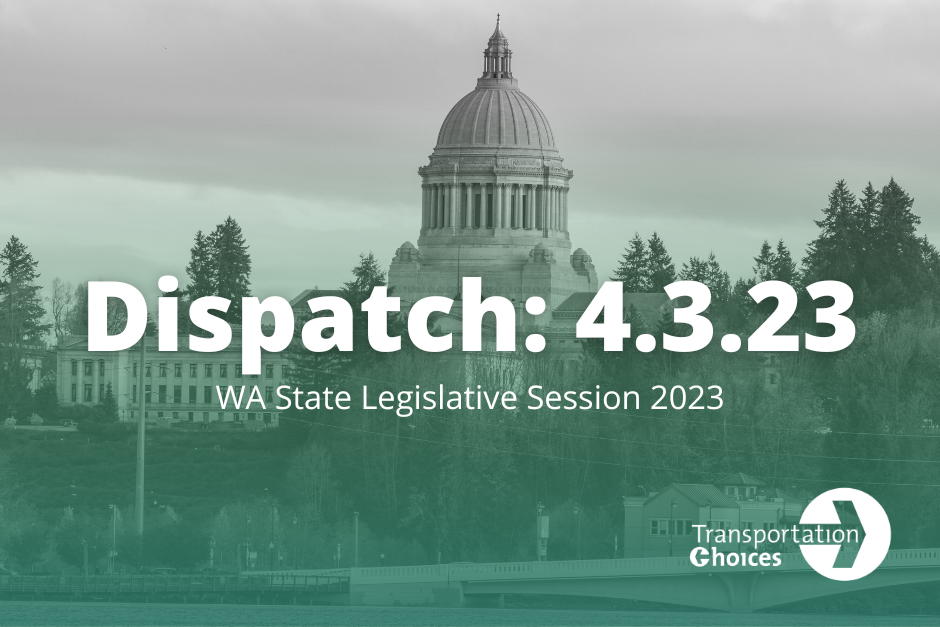
Today, Tuesday April 4th, is the last cutoff for most bills making their way through the legislature. Bills that leadership has determined as Necessary To Implement the Budget (NTIB) have another week.
All the budgets we mentioned in the last Dispatch are now live.
In these last few weeks of session, the legislature will be working to reconcile budgets between the two chambers. Items that are in one but not the other or differences between how much money is allocated for an item will have to be negotiated.
Both versions of the Transportation Budgets were heard in their respective House and Senate committees last week. Below, you’ll find a breakdown of what’s included.What’s in the Transportation Budget
TCC and our partners have been advocating for budget allocations to advance certain policy work (often called provisos).
Here are some key policy provisos and allocations:
- Road Usage Charge: After a lengthy discussion in the House, a Road Usage Charge (RUC) bill did not move forward. However, Chair Fey wants to ensure a RUC could be implemented on time and is trying to get agencies moving in the right direction. Therefore, the House Transportation Budget includes $150,000 provided for the Department of Licensing to study a per-mile fee program implementation and administration, with an additional $168,000 provided to begin a vehicle odometer mileage collection program. An equitable RUC requires equitable implementation, so we will look to monitor how DOL progresses in setting up systems for this program that align with our values.
- Workforce Shortage Study: The transit operator shortage is the single biggest threat to delivering transit service across the state. Just in this past year, thousands of hours of service have been cut due to a reduced workforce. We are grateful for two items in the Senate Transportation Budget that work toward addressing this issue, including $350,000 for the Joint Transportation Commission to assess the status of the workforce pipeline for CDL operators and mechanics in the transit, highway maintenance, and maritime sectors, and $100,000 for Washington State University to study the potential impacts that current licensing requirements and testing may have on the shortage of commercial drivers, with a focus on public transit operators. We look forward to the results of studies to be delivered in 2024 as a first step in understanding and addressing the transit worker shortage.
- Statewide Transit Level of Service Study: The Senate Transportation Budget includes $400,000 provided for the next phase and continuation of the statewide Transit Level of Service Study, also known as the Frequent Transit Service study. This will help identify how and where we should be investing in service across the state.
- Sidewalk Data Collection: Both House and Senate Transportation Budgets provide $2 million for data collection for the University of Washington’s sidewalk inventory and accessibility mapping project. Accurate and comprehensive sidewalk data plays a key part in understanding access to transit.
- Traffic Safety For All: We were interested to see $750,000 in the House Transportation Budget for a grant program to support local initiatives that establish or expand civilian intervention programs for addressing non-moving violation causes. While we think the grant program is an important part of addressing transportation safety and the needs of low-income drivers, we hope its inclusion in the budget does not take away momentum from passing the full Traffic Safety for All bill.
- Performance Based Project Funding: The Senate Transportation Budget includes $660,000 provided to WSDOT to continue implementation of a performance-based project evaluation model.
- Youth Ride Free: Move Ahead WA helped ensure transit agencies allowed youth to ride free! While most transit agencies have implemented this policy, new budget allocations will provide Amtrak with the funding to implement the same policy on their Cascades train. The House Transportation budget allocates $1.6 million and the Senate Transportation budget allocates $2.25 million for the elimination of fares for passengers 18 years of age and younger for service on the Amtrak Cascades corridor in the state.
- I-5 Planning: The House Transportation Budget provides $2.5 million and the Senate Transportation Budget provides $11.9 million for WSDOT to perform the I-5 planning and environmental linkage study and master plan.
- Mobility Partnerships Grant: We were disappointed not to see funding for WSDOT’s proposed Mobility Partnership Grant in either budget, which would have supported mobility for vulnerable populations and overburdened communities.
- High Speed Rail: Both House and Senate Transportation Budgets allocate $2.25 million to coordination, public engagement, and planning of ultra-high-speed ground transportation between British Columbia, Washington, and Oregon.
- Low Income Tolling Program: The Senate Transportation Budget includes $200,000 for a survey to assess public attitudes regarding a potential low-income tolling program for qualifying drivers. We hope this is a first step towards taking lessons learned from the low-income toll program study and creating a statewide program to ensure all Washingtonians have affordable access to transportation infrastructure and programs.
What’s coming up
SB 5466 – Promoting transit-oriented development (TOD)
We continue to work towards no minimum parking requirements near transit. Any deviation should be from an objective analysis and approved by the Department of Commerce. Requiring parking drives up the cost of housing, discourages transit use, and undermines the spirit of the bill.
The bill was voted out of Executive Session in House Housing on March 28th. It had a public hearing in House Capital Budget on March 30th. It was then voted out of House Capital Budget on March 31st.HB 1110 – Increasing middle housing in areas traditionally dedicated to single-family detached housing
The bill had a public hearing in Senate Ways and Means on March 31st. It was scheduled for executive action on April 3rd in Senate Ways and Means.HB 1181 – Improving the state’s response to climate change by updating the state’s planning framework




